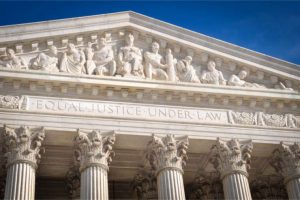Washington, D.C., May 28, 2019, CNA—The U.S. Supreme Court on Tuesday upheld part of an Indiana law requiring aborted babies to be cremated or buried, while declining to take up another part of the law that banned abortions based solely on the sex, race, or disability of the baby.
The 2016 Indiana legislation had been signed into law by U.S. Vice President Mike Pence when he was governor of the state. The Seventh Circuit Court of Appeals blocked the law from taking effect.
In an unsigned three-page opinion, the Supreme Court cited a previous decision that states have a “legitimate interest in proper disposal of fetal remains.”
“The Seventh Circuit clearly erred in failing to recognize that interest as a permissible basis for Indiana’s disposition law,” the court said.
However, the court declined to consider the other part of the law, which banned abortions that are based solely on race, sex, or disability, saying the law raises issues that have not yet been adequately considered by appellate courts.
The court’s ruling was welcomed by pro-life advocates as a partial victory. Dozens of cases currently in the court system involve various state-level abortion restrictions, and many pro-life groups have voiced hope that one of the challenges will become the impetus for the Supreme Court to reconsider the 1973 Roe v. Wade decision that mandated legal abortion nationwide.
Who could think otherwise about their own child or grandchild?
“Unborn infants shouldn’t be disposed of as ‘medical waste’ when they die before birth, regardless of whether their deaths are spontaneous, accidental, or induced,” said Denise Burke, senior counsel for Alliance Defending Freedom, a pro-life legal group that had filed a brief in the case.
“Further, the broken bodies of aborted infants shouldn’t be exploited for scientific experimentation,” she said. “Since the horrific 2015 revelations that Planned Parenthood harvested and sold the body parts of aborted infants—including brains, hearts, livers, lungs, and muscle tissue—it has become apparent that this must be addressed in state law.”
However, while Burke praised the justices for upholding the fetal remains provision of the law, she also expressed disappointment that they did not rule on the other aspects of the legislation.
“Indiana law also sends a clear message that all victims of discrimination – born and unborn – are worthy of protection,” she said. “We had hoped the Supreme Court would take this opportunity to revisit the 7th Circuit’s deeply flawed ruling, which endorses a lethal form of discrimination, as long as it occurs in utero.”
Kristan Hawkins, president of Students for Life of America, had a similar reaction.
“The Justices got it right that aborted infants need to be buried and cremated respectfully as they are human beings, not trash, but it’s tragic they didn’t see their humanity when they still have a chance at life,” Hawkins said in a May 28 statement.
However, she said, “with so many cases advancing on the life issue, we believe that another opportunity to do the right thing will soon be presented.”
Justice Clarence Thomas’ concurring opinion
In a 20-page concurring opinion, Justice Clarence Thomas stressed that the court will eventually need to consider the question of abortions chosen for eugenic reasons.
“A growing body of evidence suggests that eugenic goals are already being realized through abortion,” he said, pointing to the eugenic views of Planned Parenthood founder Margaret Sanger, who advocated birth control as a means “to assist the race toward the elimination of the unfit.”
With abortion rates of children with Down syndrome approaching 100% in some countries, and sex-selective abortions in Asia leading to as many as 160 million “missing” women, Thomas argued that “abortion has proved to be a disturbingly effective tool for implementing the discriminatory preferences that undergird eugenics.”
“Although the Court declines to wade into these issues today, we cannot avoid them forever. Having created the constitutional right to an abortion, this Court is duty-bound to address its scope,” he said.



You must be logged in to post a comment.